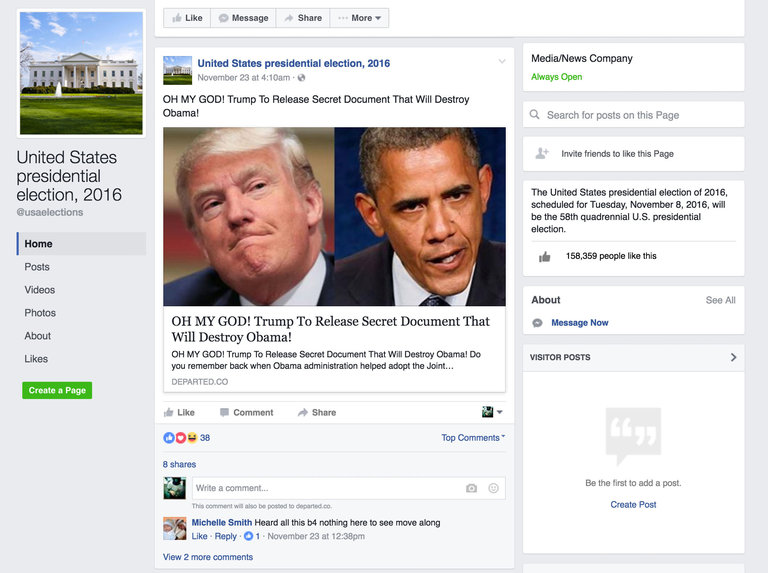[vc_row][vc_column][vc_column_text]
Social media is all atwitter these days with the unremarkable discovery that people lie.
So much so that Oxford Dictionaries has designated “post-truth” as its international word of the year. For those of you not hip to the jargon, it means “relating to or denoting circumstances in which objective facts are less influential in shaping public opinion than appeals to emotion and personal belief.”
In other words, facts don’t count.
Perhaps spawned by the spate of alleged news stories made up out of whole cloth during the recent presidential election in the United States, people of all stripes are weighing in on the issue du jour: How can we ensure that what we read on Facebook or Twitter is real?
I ask, “Why bother?”
Consider the Ninth Commandment (or Eighth, at least as interpreted by Catholics and Lutherans): “Thou shalt not bear false witness against thy neighbour.”
That sounds like a dire warning against lying, which was something that must have been quite popular during the day, and still is. Besides going to hell, most every country in the world has libel laws designed to compensate people whose reputations have been damaged by lies.
But today the allegation of lying seems to be taking on more sinister effects. There have been some allegations that false news stories actually swung votes in the US presidential election. If so, why is “fake news” so effective? I believe we can go back to Lord Mansfield’s 18th century dictum “the greater the truth, the greater the libel” for some insight. Whether we just want to believe something is true or we pick and choose our truths to match our political cloth, we find ourselves in an era where we can scan a headline, read the lede and say, “That seems believable enough.”
Thus, manufacturing stories out of thin air has become a cottage industry and an apparently successful one.
Trying to get on the perceived “right side” of the issue, it comes as little surprise that social media companies such as Facebook are engaged in damage control, saying they are trying out new versions of their algorithms to weed out postings that are simply made up.
And to that I again ask, “Why bother?”
For in fact, doing so may just cause greater harm to free expression than any lie, no matter how damaging.
Because besides the difficulty in determining truth from opinion to a bald-faced lie, the inherent limiting of ideas, including criminalising them, makes us all suffer a little bit.
Today we are seeing criminal and administrative prosecution for activities on social media platforms that involve responding to existing content (i.e. sharing, re-posting, uploading, liking, quoting and commenting) and that contributes to an environment of fear.
Combine this with the growing tendency for nations to apply anti-extremism and anti-terrorism laws to content on social media platforms and the result is social media users, including members of the media, are being fined, arrested and imprisoned for interacting or reacting to content produced by third parties or for expressing their opinions on it.
This is censorship and can lead to self-censorship.
Instead, issues related to social media activities should be addressed exclusively through self-regulation, education and literacy, not through new restrictions.
As the Representative on Freedom of the Media for the Organization for Security and Co-operation in Europe, I recently recommended that the participating states that comprise the body to recognize the following:
- That no one should be penalised for social media activities that come as a reaction or interaction with existing content;
- That no one should be penalised for the social media activities such as posting and direct messaging unless they can be directly connected to violent actions and satisfy the test of an “imminent lawless action”;
- That no one should be held liable for content on social media platforms and on the internet of which they are not the author, as long as they do not specifically intervene in that content or refuse to comply with court orders to remove that content, where that have the capacity to do so (“mere conduit principle”);
- The necessity to decriminalise defamation, insult and blasphemy;
- That any imposition of any sanctions imposed by courts of law, especially when it comes to social media activities, should be in strict conformity with the principle of proportionality;
- The need for education and literacy on freedom of expression on the internet.
Let’s not overreact to the wave of fake news by building another wall around the internet.
Dunja Mijatović is the Representative on Freedom of the Media for the OSCE, based in Vienna.[/vc_column_text][/vc_column][/vc_row][vc_row][vc_column][vc_basic_grid post_type=”post” max_items=”4″ element_width=”6″ grid_id=”vc_gid:1480348630223-46408dc4-0b68-7″ taxonomies=”6380″][/vc_column][/vc_row]




